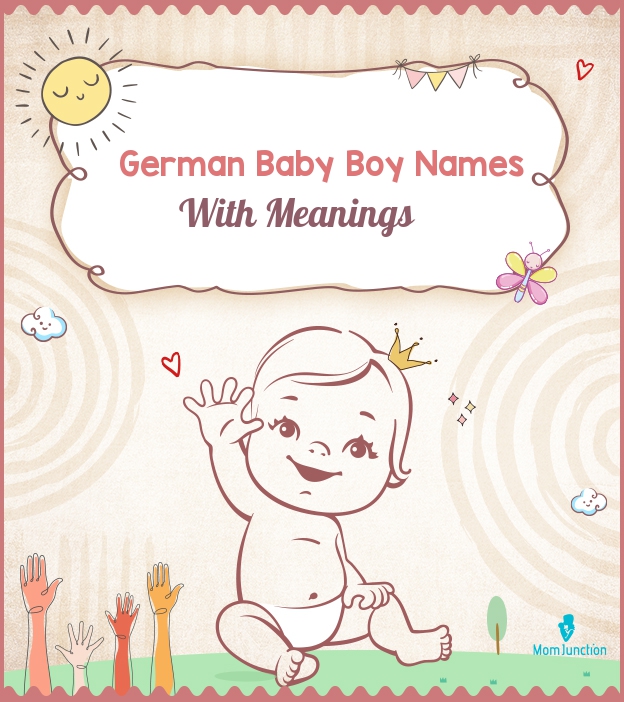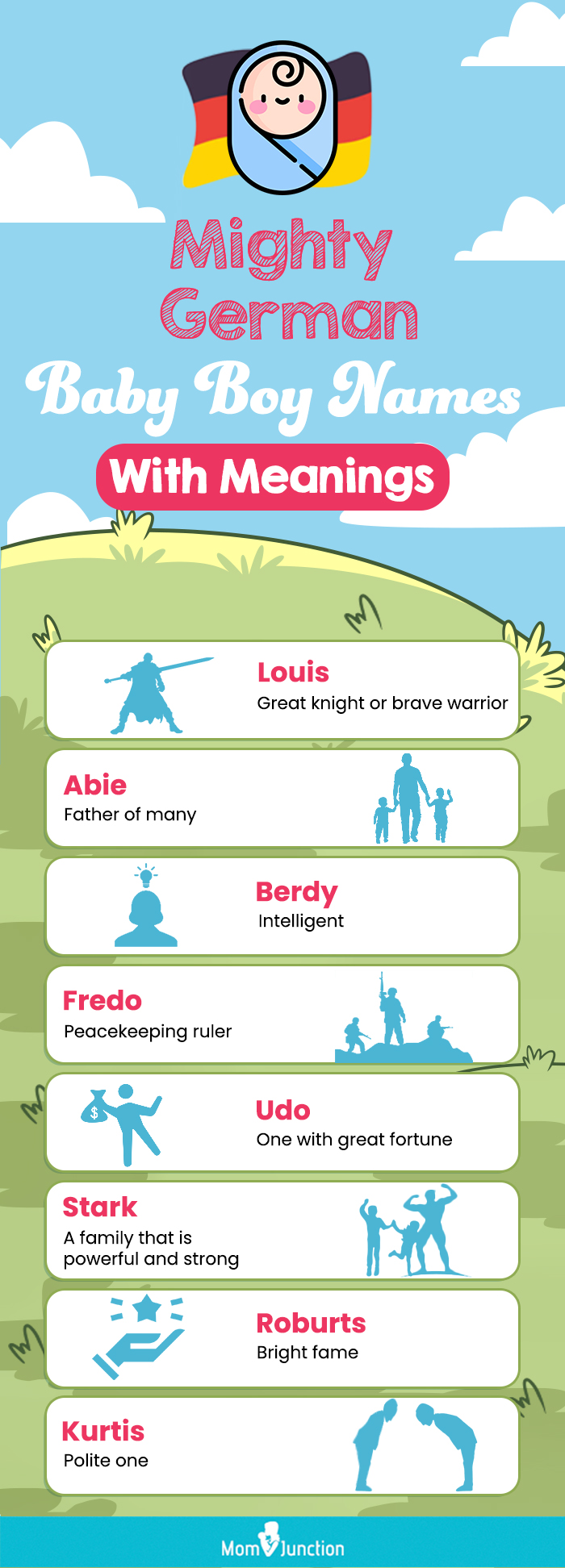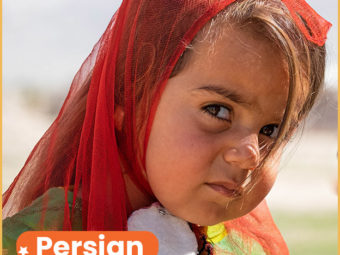1512 German Baby Boy Names With Meanings
From the classic 'Alexander' to the modern 'Adie,' these German names are one of a kind.

Illustration: MomJunction Design Team
Germany is home to a rich cultural heritage, which is evident through the vast archive of German boy names it boasts of. Whether you prefer a rooted and traditional name from the illustrious pages of Germanic history or seek a more chic and modern name that is in sync with the ever-evolving world, this wealthy collection has something for every parent-to-be.
Germans practice naming traditions that are similar to those of Anglo-Australians. Typically, most Germans are given two gender-specific personal names by their parents. One serves as the first name and the other as a middle name, and then they are followed by a family name passed on from the paternal side of family. While it was once customary to name children after their grandparents, this tradition is gradually waning.
Traditional German names often have Biblical origins, such as Johann/Hans (John), Georg/Jörg (George), Jakob (Jacob), Anna, Maria, and Christina. Families often adopt the same saint's name for multiple children's first names. For instance, John and George were the favored choices for boys tracing back to St. John and St. George. Furthermore, the naming pattern for German children often follows a tradition where the first son is named after the paternal grandfather, the second son is named after the maternal grandfather, and the third son is named after the father (1).
With modernization, the German naming patterns have drifted, and as German emigrants who settled in America anglicized their names, American versions of German names could be seen. For example, there were more ‘Henrys’ than ‘Heinrichs’ and ‘Marys’ than ‘Marias.’ German naming tradition had a unique feature that was often disrupted by circumstances. So when there was a duplicate name in the pattern, the next name in the pattern was automatically used. Also, if a child died in infancy, his or her name was reused for the next child of the same gender. Similarly, the names were repeated if a spouse died and the surviving spouse remarried and had more children. This way, half the siblings were with the same names. Momjunction enlists unique and interesting German names for your baby boy in the list below.
| Name | Gender | Meaning | |
|---|---|---|---|
| | Strong; Unique | ||
| | God has remembered | ||
| | Blessed; Happy | ||
| | Defender; Protector | ||
| | Airship; Blimp | ||
| | Goal; Destination | ||
| | Ornament; Decoration | ||
| | Victory protector | ||
| | Shadow; Shade | ||
| | A type of flowering plant; Symbol of endurance | ||
| | Water; A city in Switzerland | ||
| | Two | ||
German boy names boast a rich heritage and timeless charm that parents find appealing. These names often resonate with strong cultural and historical significance, carrying meanings of strength, wisdom, and resilience. Whether one seeks traditional names with deep roots in Germanic folklore or contemporary options, Germanic boy names provide a perfect blend of tradition with a modern flair that suits the taste of every parent. Choosing a German name for your baby boy can be an excellent way to honor family traditions or explore the fascinating cultural diversity of Germany.
Infographic: Inspirational German Names For Your Little Warrior
Do you want a genuinely unique-sounding name for your little one? Well, look no further than those belonging to the German language. They have a hard consonant sound with influences from various European languages. The names are equally modern and traditional. So check out the infographic and pick the one that best suits your little one.
Illustration: Momjunction Design Team
Frequently Asked Questions
1. What are German names for victory?
Some German names that convey the idea of victory include Sieglinde, which combines the words sieg, meaning victory, and linde, meaning gentle or soft, and Sieghild, which combines sieg and hild, meaning battle or struggle.
2. What German name means powerful?
The German name Gertrude carries the meaning powerful. It combines ger, meaning spear or spear strength, and trud, meaning strength or power.
3. What German boy name means intelligent?
Albert is a masculine name of German origin, meaning intelligent, noble, or bright.
4. What German boy name means lion?
The German name Leo means lion. It is usually used as a short form of Leopold, which means lion-hearted.
5. What German boy name means warrior?
The German boy's name Ritter carries the meaning of a mounted warrior. Its origin can be traced back to the Middle High German language, where it referred to a knight or rider.
6. What German name means freedom?
Karle is a boy's name of Old German origin meaning free man..
7. What is a traditional German name?
Traditional German names frequently have Germanic or Old High German origins and represent German culture and history. Friedrich, Wilhelm, Hans, and Klaus are examples of traditional German names for boys, whereas Heidi, Ingrid, Greta, and Liesl are examples of traditional German names for girls.
8. What are some German baby boy names that have royal or noble connotations?
Ludwig, Friedrich, Heinrich, and Maximilian are German boy names with royal or noble connotations.
9. What are some German baby boy names that have been influenced by other cultures or languages?
Johann, Stefan, Erik, and Markus are German boy names that have been influenced by other cultures or languages. These names have origins in a variety of languages and are a symbol of Germany's cultural diversity and linguistic influences.
References:
- German naming conventions
https://www.scchgs.org/documents/meetinghandouts/German_Naming.pdf/a>
Look Up For Many More Names
Do you have a name in mind and want to know more about it? Or want to find names belonging to a particular origin, religion, or having a specific meaning? Use our search tool below to explore more baby names with different combinations.















